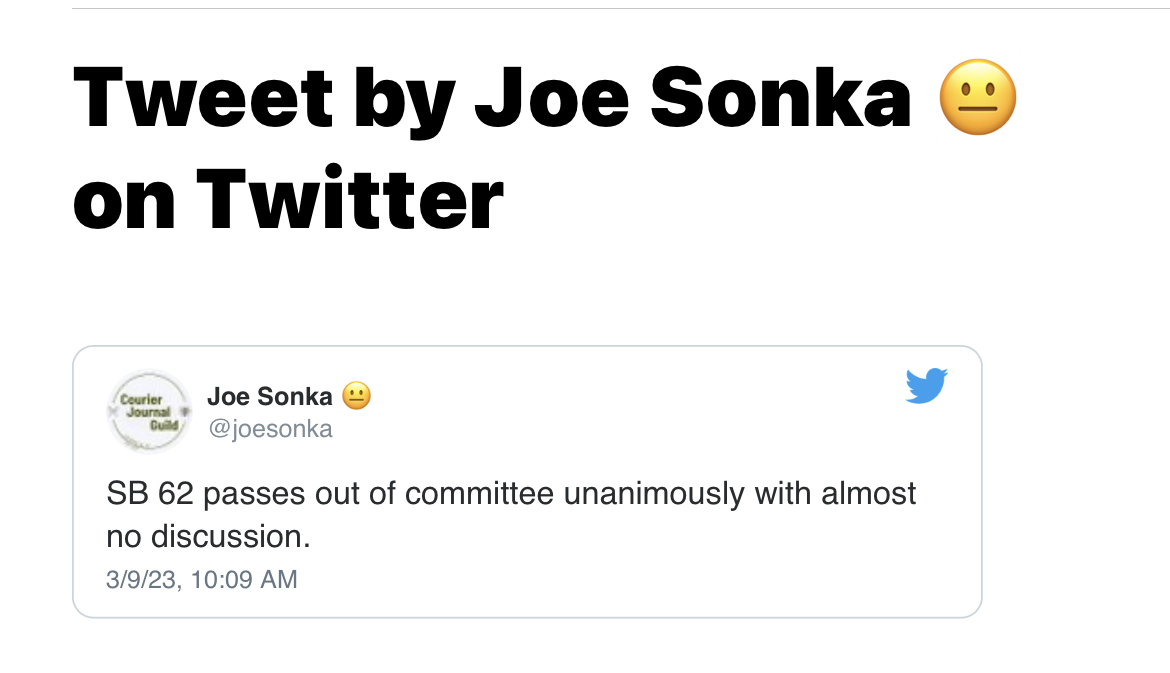
After a stressful day and a restless night, I slept through the five minute House Standing Committee on Elections, Constitutional Amendments and Intergovernmental Affairs meeting at which SB 62 was to be discussed.
No harm, it appears, as Courier Journal reporter Joe Sonka tweets, "SB 62 passes out of committee unanimously with almost no discussion."
https://apps.legislature.ky.gov/record/23rs/sb62.html
A single question, posed by Chairman Bratcher, can be observed in the KET Archives. He asks for confirmation that the bill does not affect campaign finance disclosure, evoking a surprising nonresponse from SB 62 sponsor Whitney Westerfield. The latter explains that the bill encompasses all nonprofits under state law, but does not offer the expected confirmation.
https://ket.org/share/legislature/archives/?nola=WGAOS+024135&stream=aH…
Not missing a beat, Bratcher calls for a vote, and SB 62 moves to the House Floor with full committee approval.
Opposition, it seems, is futile, but opponents -- like the Kentucky Press Association and the Kentucky Open Government Coalition -- must not relent.
https://kyopengov.org/blog/senate-bill-repudiating-university-louisvill…
https://www.courier-journal.com/story/news/politics/2023/02/22/senate-a…
Our objections may not be identical, but the KPA and the Coalition are uniquely qualified to recognize potential impediments to existing media and public rights of access.
Lawmakers are uniquely unqualified.
Their disdain for open government was nowhere more evident than in 2021's HB 312, excluding the General Assembly and Legislative Research Committees from the open records law.
Sen. Westerfield insists that HB 62 does nothing more than codify a 2021 United States Supreme Court case, Americans for Prosperity Foundation v Bonta, holding that a California requirement for non-profit organizations to disclose their donors to the state Attorney General was invalid because it burdened the First Amendment rights of the donors.
https://www.supremecourt.gov/opinions/20pdf/19-251_p86b.pdf
Westerfield acknowledges that there is no actual threat
in Kentucky similar to the threat addressed in the federal case. His solution looking for a problem has become the norm in Kentucky's legislature.
But HB 62 is likely to create multiple problems in interpretation of existing open records law as delineated in the statements of opposition issued by the KPA and the Coalition.
The KPA objects that the bill -- captioned "The Personal Privacy Protection Act” -- will "restrict[ ]the right of the public and press to access what is deemed to be personal information of donors in court proceedings, with courts prohibited from allowing such information into the public record without first finding 'good cause.'"
"KPA attorneys said courts 'must default to sealing and redacting "personal information" from the court record and closing otherwise public trials to the press and public if "personal information" is presented.'"
The KPA also expresses concern that “draconian penalties" for disclosure will "flood Kentucky’s courts with frivolous lawsuits designed to cash-in on an unwitting civil servant’s incidental disclosure of benign information and chill the production of nonexempt information in response to valid open records requests."
The Coalition's objections are premised on the potential that officials will improperly invoke the new categorical exclusion for "personal information," as narrowly defined in HB 62, to deny access to "personal information" that has generally been deemed accessible under the open records law privacy exception --KRS 61.878(1)(a) -- where the public's interest in disclosure outweighs the privacy interests that may be implicated by disclosure.
For example, in 2008 the Kentucky Supreme Court determined that identities of donors to the non-profit University of Louisville Foundation were not protected by the privacy exception since the public “has a legitimate interest in the amounts and sources of monies donated to the [University of Louisville] Foundation which ultimately funds the University.”
https://caselaw.findlaw.com/ky-supreme-court/1439464.html
Under SB 62, donors could avoid disclosure of their identities by requesting anonymity from the nonprofit organization.
The great body of Kentucky law construing the personal privacy exception -- which turns on an examination of competing public and private interests -- is threatened by a categorical exception like the exception for "personal information" found in SB 62.
The problem is illusory. The threat is real.



